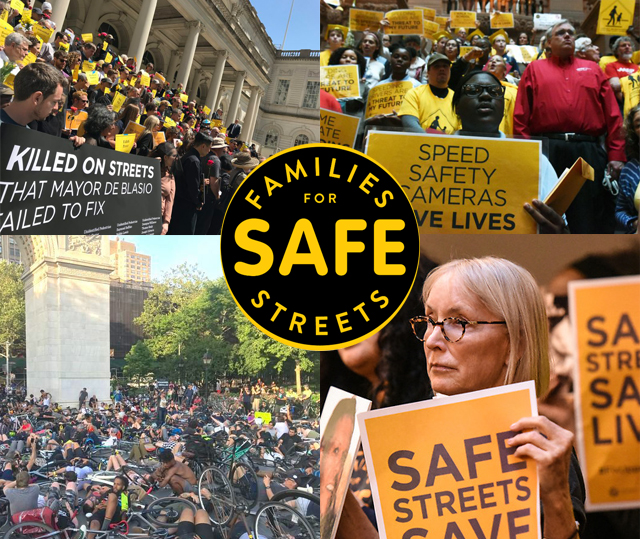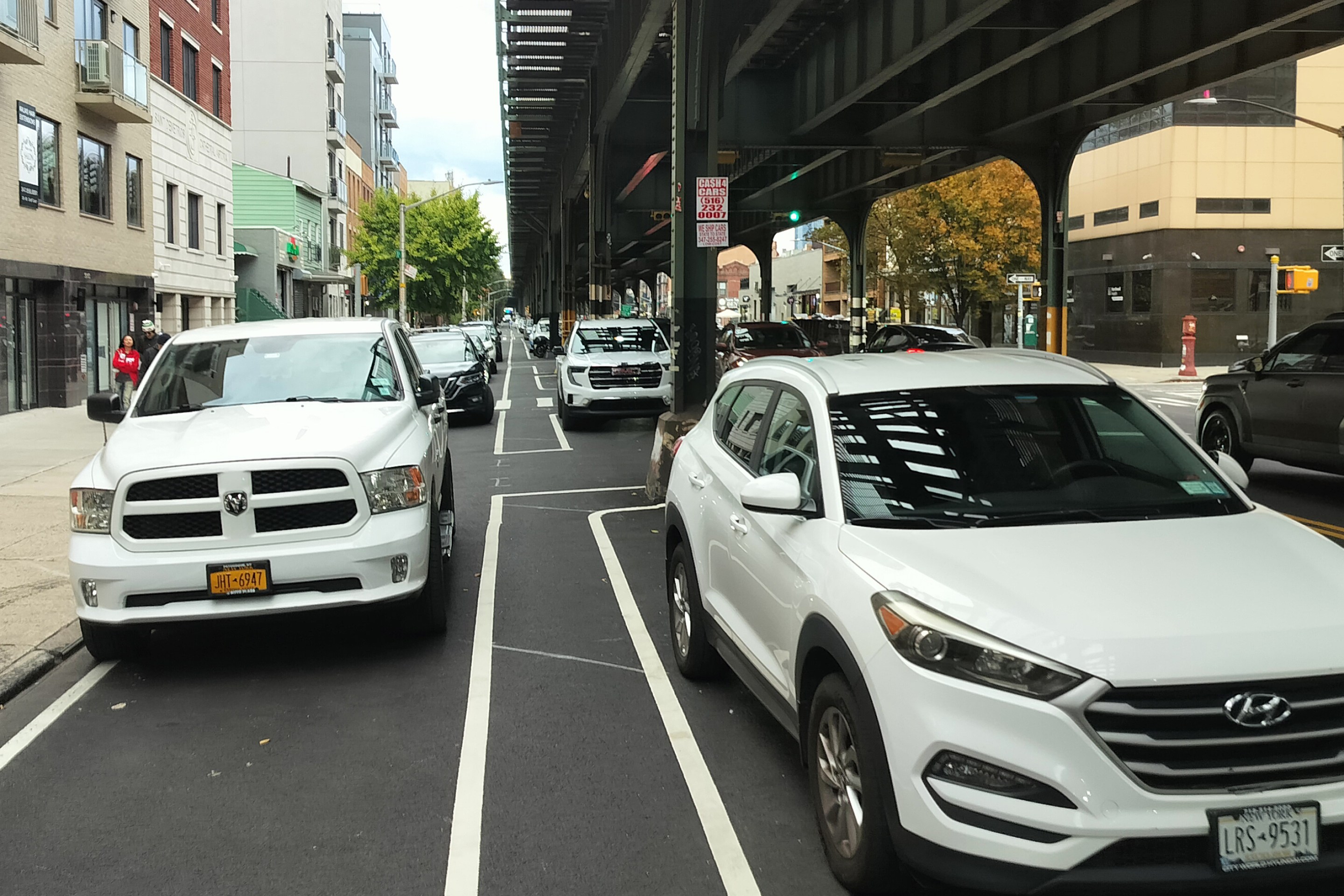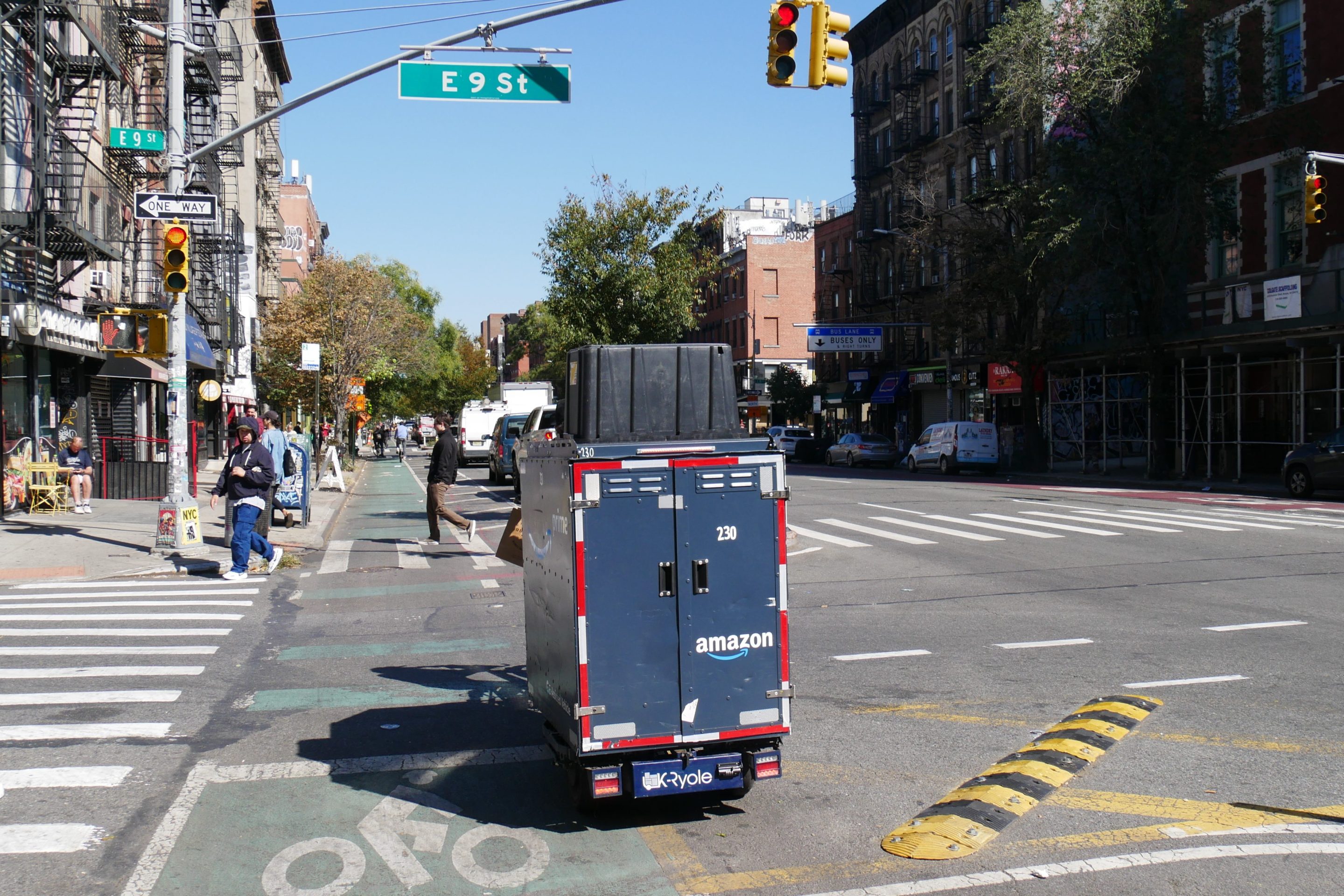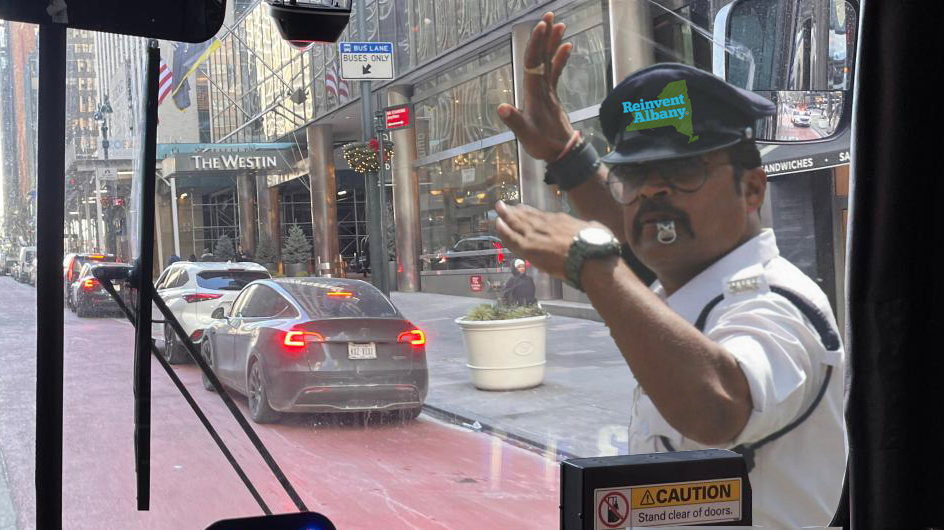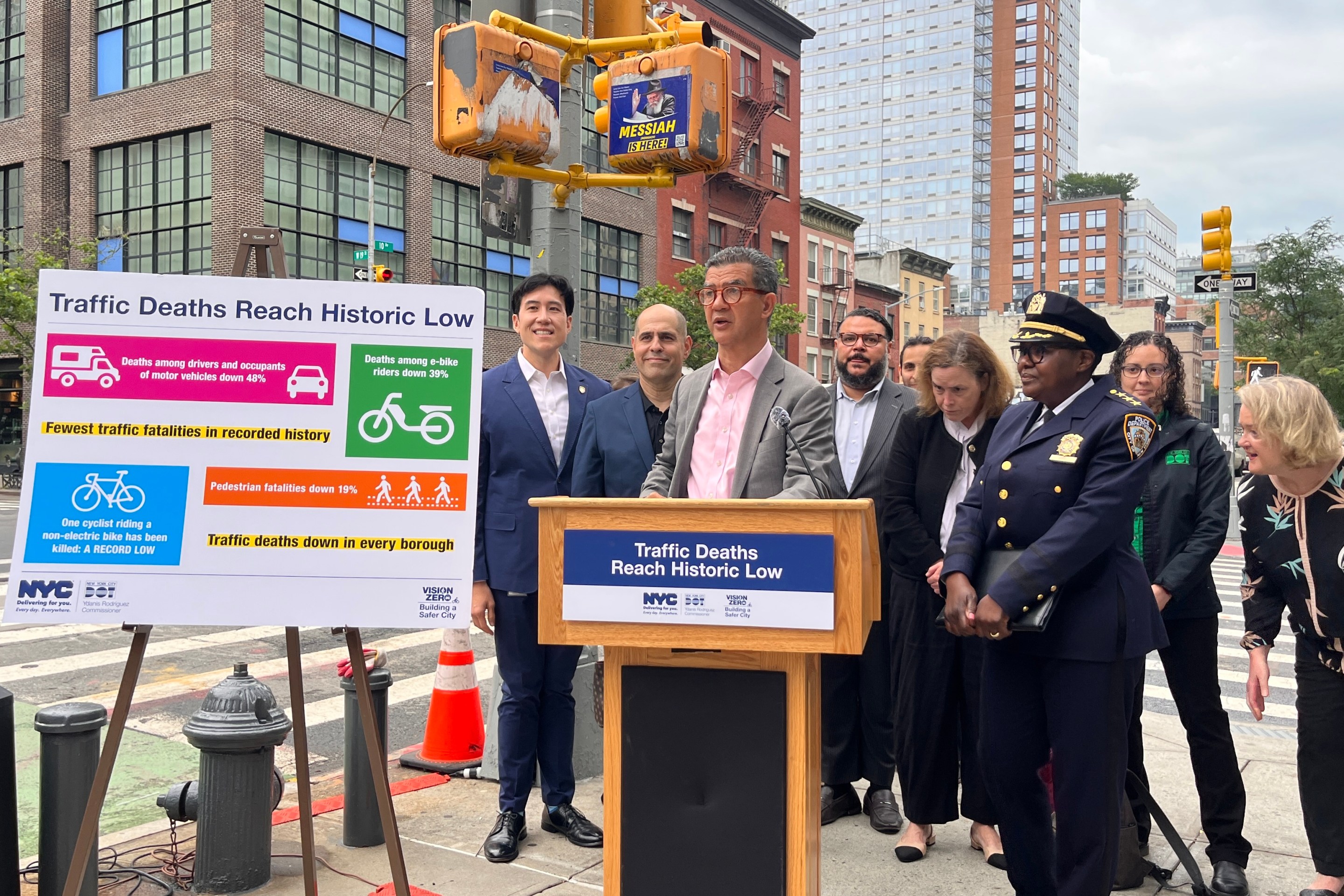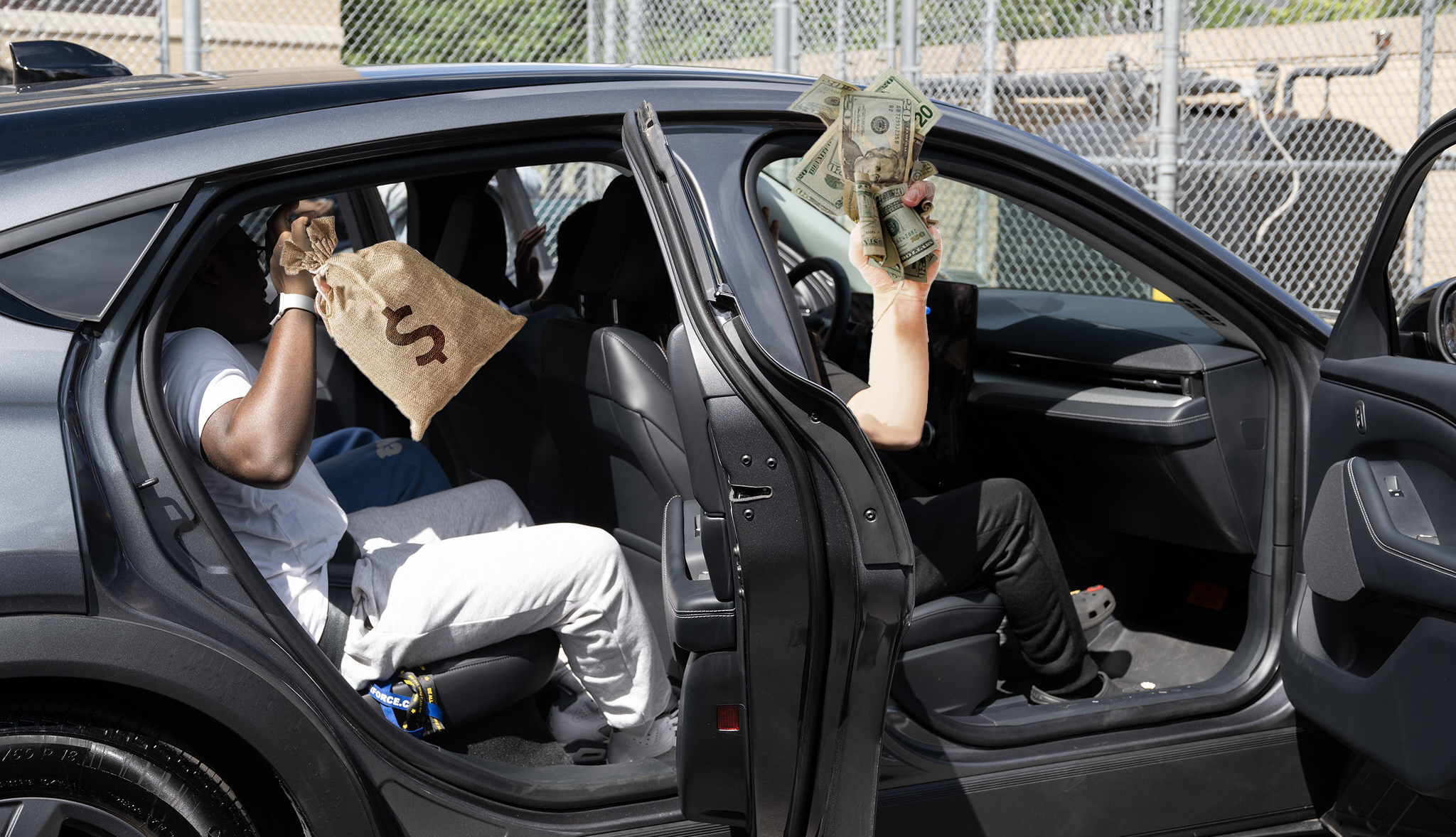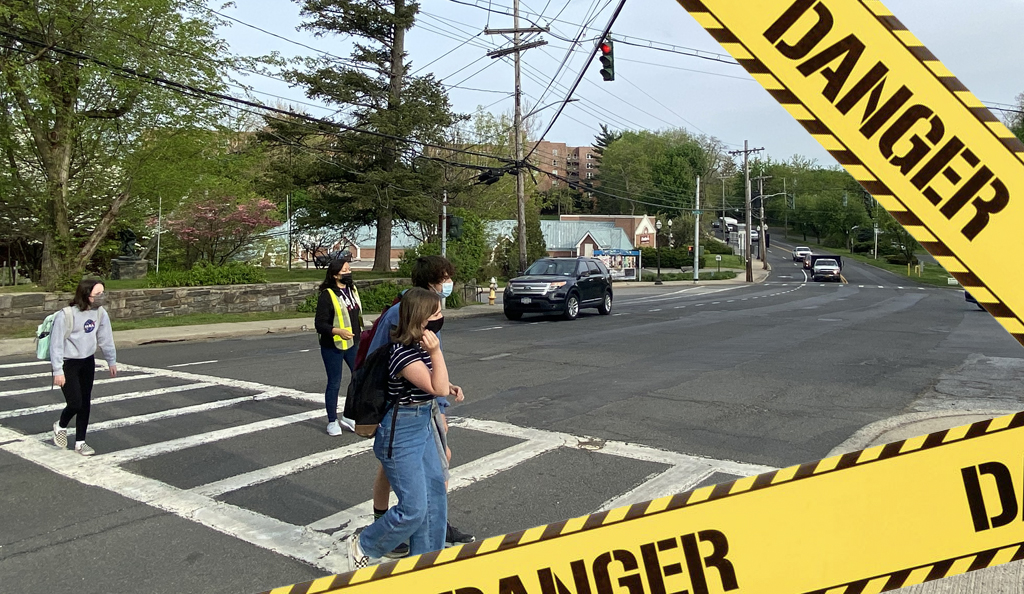Fresh off several years of legislative wins, livable streets groups are pushing Albany lawmakers to adopt a raft of street-safety measures in order to bring to heel mounting traffic violence in the state.
The coalition, led by Families for Safe Streets, Transportation Alternatives, Mothers Against Drunk Driving, N.Y. Bicycling Coalition and allied legislators, is lobbying online for eight bills, collectively dubbed the Crash Victims Rights & Safety Act, during the week of April 19, which coincides with the national Crime Victims Rights Week. The bills seek to prod consumers to purchase safer vehicles, make it easier to hold reckless drivers accountable, lower speed limits, expand the use of speed cameras, combat alcohol-impaired driving, educate new drivers about vulnerable road users, and improve road safety for cyclists, among other measures.
“We have the tools to cure the epidemic of traffic violence. What we need now is for lawmakers to act," said Amy Cohen, co-founder of Families for Safe Streets and mother of Sammy Cohen Eckstein. “I know this firsthand: In 2013, my 12-year-old son was killed by a reckless driver. After that, I fought to lower New York City's speed limit, and a year later, when a driver crashed into another child on the same street, the lower speed limit meant that child survived. But today, too many are still killed in traffic on unsafe streets. It is time for New York State to enact a comprehensive plan to make our streets safer and ensure that crash victims have greater support.”
In the last seven years, this broad coalition has succeeded in enacting legislation to lower speed limits in New York City, launch speed-camera enforcement in school zones around the state (and, later, expand the use of those cameras), legalize and regulate e-bikes and e-scooters, and mandate congestion pricing in the city’s central business district.
Despite a significant decrease in driving in 2020, traffic fatalities and speeding rose dramatically. New Yorkers need the Crash Victims Rights & Safety Act to stop rising traffic fatalities on our streets. #Rights4CrashVictims #SafeStreetsNowNY https://t.co/IZmlXorL4P pic.twitter.com/3SJX7xKORk
— Transportation Alternatives *Vote on Sammy's Law* (@TransAlt) April 8, 2021
The new bills are important because New York’s traffic-violence statistics remain alarming and are becoming even more so. According to the state Department of Health, an average of three New Yorkers die every day in traffic crashes. In 2019, 931 people were killed in vehicle-related crashes, making such crashes the leading cause of injury related death, the second-leading cause of injury related hospitalizations, and third-leading cause for injury related emergency department visits. Vehicle crashes cost the state at least $15 billion annually in combined costs from hospitalization, emergency response, legal expenses, lost wages, and lost economic activity, according to federal data.
In New York City, crashes claimed the lives of at least 243 in 2020 — making it the deadliest year since Mayor de Blasio adopted his Vision Zero program to eliminate traffic deaths in 2014. The proximate cause of all the carnage was the COVID-19 pandemic, which emptied streets during the early days of the lockdown. The open roads habituated many reckless drivers to speeding, which they continued even as more vulnerable users returned to roadways. From July 1 through Oct. 31, 2020, for example, total road fatalities rose almost 40 percent compared to the previous year, while pedestrian deaths rose 16 percent, and car driver deaths nearly doubled.
“With the COVID-19 pandemic has come an epidemic of fatal crashes and increased speeding on our streets,” Marco Conner DiAquoi, deputy director of Transportation Alternatives, said in a statement. “New York needs bold action to save lives. The Crash Victims Rights & Safety Act is a multi-pronged approach that will support survivors and help stop the rising tide of traffic deaths. Our statewide coalition is working tirelessly to secure passage of all eight bills in this package this year. We cannot wait any longer when it comes to saving lives.”
The Crash Victims Rights & Safety Act includes:
- Traffic-Crash-Victim Bill of Rights — which gives crash victims rights like those of the federal Crime Victims’ Rights Act, including the right to receive timely crash reports and the right to attend crash-related hearings and submit impact statements. It would also require the state to report data about crash-victim compensation and support, including no-fault insurance and private insurance.
- Sammy’s Law — named for Samuel Cohen Eckstein (son of Amy Cohen), a 12-year-old from Brooklyn who was killed by a reckless driver in 2013, the bill would repeal a state regulation prohibiting New York City from lowering the speed limit below 25 mph (or 15 mph in school zones).
- Speed-Safety Camera Improvement — which would authorize New York City to operate speed-safety cameras 24/7, would escalate penalties for extreme repeat offenders, including license suspension, and would allow records of speeding to be shared with auto insurance companies. The city now may not operate the cameras outside of weekdays between 6 a.m. and 10 p.m., even as a recent NYC Department of Transportation report found that speed-safety cameras reduce speeding by 72 percent and injuries by 17 percent, and two-thirds of vehicles ticketed by safety cameras did not receive another violation in the same calendar year.
- Vehicle-Safety Rating — which would require the NYS DOT and the state Department of Motor Vehicles to create a safety-rating system to assess the risk a motor vehicle poses to vulnerable road users, and would require that such ratings be displayed at the point of sale and on a state website. No safety-rating system exists for risks a vehicle poses to people outside a car, which are especially acute for large, heavy vehicles. In New York City, 25 of the 29 cyclists who were killed in 2019 were killed by drivers of large trucks, buses, SUVs or vans.
- Dangerous-Driving “Rule of Two” — which would clarify existing law to address the “rule of two” — a “rule of thumb” in which prosecutors need to prove that the driver committed two separate moving violations such as speeding, running a red, failure to yield, etc. — in order to make it easier for the most reckless drivers to be held accountable under existing misdemeanor law (VTL 1212), especially when they injure or kill someone. The legislation would replace “reckless” with “dangerous” in “reckless driving” in order to avoid confusion with mens rea (state of mind) analysis.
- Blood-Alcohol Content Lowered to .05 — which would lower the blood alcohol concentration limit for driving from .08 percent to .05 percent, and for aggravated driving while intoxicated from .18 percent to .12 percent.
- Safe Passage for Cyclists — which would provide a clear objective definition of what a “safe distance” is for motorists when overtaking bicyclists on the road (at least three feet), provide a mechanism for accountability following a crash, and foster a culture of safer driving through education.
- A DMV Pre-licensing Course — which would require instruction in pedestrian and bicyclist safety as part of drivers’ pre-licensing courses and would educate new drivers on how to safely pass bicyclists on the road and the dangers that large multi-ton vehicles pose to pedestrians, bicyclists, and other vulnerable road users.
"Every year, hundreds of precious New Yorkers are killed in traffic crashes, but it doesn't have to be this way," said Assembly Member Emily Gallagher, a sponsor of the DMV-related bill. "With the package of bills in the Crash Victims Rights & Safety Act, we can address reckless driving, end these unacceptable tragedies, and finally create the conditions for everyone's shared safety on our public streets."
